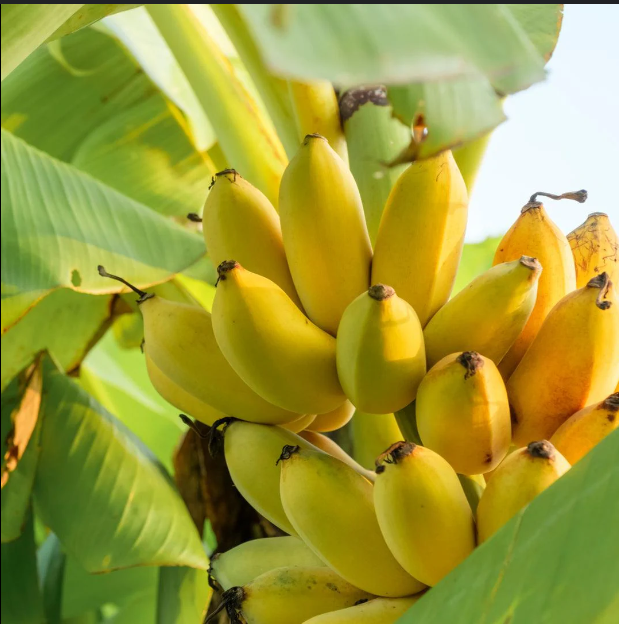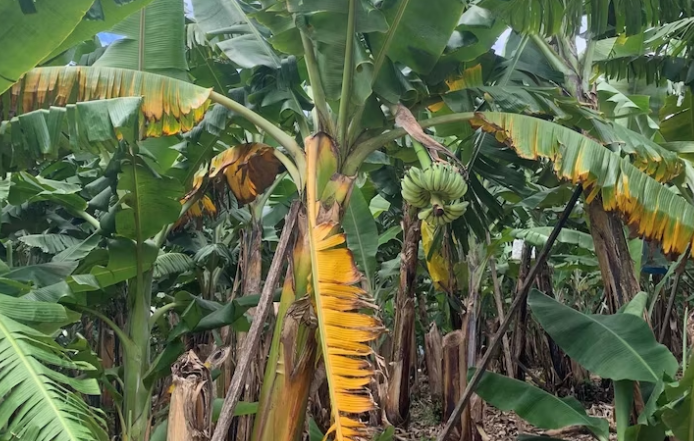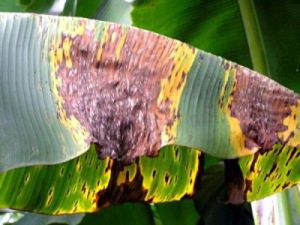Banana plant
Banana (Musa spp.) is a herbaceous plant that grows 10-25 ft tall, hardy in USDA Zones 9-11, prefers well-drained, loamy soil, full sun, high moisture, is edible, and has medicinal uses.

Habit
Herbaceous
Height
10-25 ft
Growth
Fast
Soil
Well-drained loamy soil
Shade
Full Sun
Moisture
3-7 m
Edible
Yes
Medicinal
Yes
Origin
Southeast Asia
Climatic Condition
Tropical
Temperature (°)
25-35°C
Humidity (%)
60-80%
Potting media
Garden soil
Fertilizers
Balanced NPK
Watering
Regular watering; keep soil moist
Plant Weight
20-50 kg
Flowering Time
Soil Ph level
5.5 - 6.5
Water Ph level
6.0 - 7.0
Soil EC
Medium
Yield Per Plant
25-40 kg of banana's per an average banana plant
NPK ratio
8:10:10
life Span
Perennial
Health Benefits
Rich in potassium; supports heart health.
Suggested Grow Media or Potting Mix ?
50% loamy soil, 30% compost, 20% sand
Suggested Fertigation/Fertilizers
Fertilize monthly with a high-potassium fertilizer.
Common Diseases and Remedies
Black Sigatoka Fusarium Wilt Banana Bunchy Top Virus Anthracnose
Brown streaks and spots on leaves Wilting, yellowing leaves, vascular discoloration Stunted growth, chlorotic leaves Dark sunken spots on leaves and fruit
Remove infected leaves, improve air circulation Remove infected plants, improve soil drainage Remove infected plants, control aphid vectors Remove infected plant parts, copper fungicide
Fungicides with azoxystrobin or propiconazole Fungicides with thiophanate-methyl or benomyl None effective, focus on prevention Chlorothalonil
HEALTH BENEFITS
Bananas are a highly nutritious fruit packed with essential vitamins and minerals. Here are some key health benefits of bananas:
1. Rich in Nutrients
- High in potassium, which supports heart health and blood pressure regulation.
- Good source of vitamin C, boosting immunity.
- Contains vitamin B6, which helps brain function and red blood cell production.
- Provides fiber, aiding digestion and gut health.
2. Supports Heart Health
- Potassium helps regulate blood pressure and reduce the risk of heart disease.
- Fiber helps lower cholesterol levels.
3. Aids Digestion
- Resistant starch in unripe bananas acts as a prebiotic, supporting gut bacteria.
- Pectin (a type of fiber) helps prevent constipation and improves bowel movements.
4. Provides Energy
- A great source of natural sugars (glucose, fructose, and sucrose) for quick energy.
- Ideal for athletes and post-workout recovery.
5. Helps Manage Weight
- Low in calories and high in fiber, keeping you full for longer.
- Resistant starch in unripe bananas may reduce appetite.
6. Supports Brain Health & Mood
- Contains tryptophan, which the body converts into serotonin (the "happy hormone").
- Vitamin B6 supports neurotransmitter function, improving mood and reducing stress.
7. Good for Kidney Health
- Potassium helps prevent kidney stones and supports kidney function.
8. May Help with Exercise Recovery
- Replenishes electrolytes lost in sweat.
- Reduces muscle cramps due to potassium and magnesium content.
9. Supports Blood Sugar Control
- Unripe bananas have a low glycemic index, making them good for blood sugar regulation.
- Resistant starch slows down sugar absorption.
10. Improves Skin Health
- Vitamin C helps in collagen production for healthy skin.
- Antioxidants help fight skin aging.

